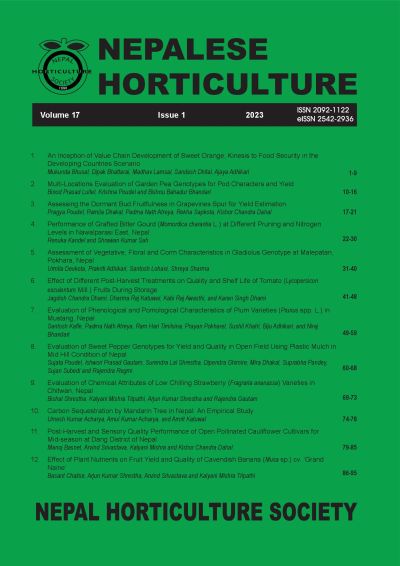Evaluation of Sweet Pepper Genotypes for Yield and Quality in Open Field Using Plastic Mulch in Mid Hill Condition of Nepal
DOI:
https://doi.org/10.3126/nh.v17i1.60634Keywords:
Genotypes, Sweet pepper, Plastic Mulch, Yield, Postharvest qualityAbstract
Sweet pepper is an emerging high value vegetable crop. There are few numbers of varieties recommended in Nepal despite of having immense commercial farming potentiality. An experiment was conducted during 2020 and 2021 at National Horticulture Research Centre, Khumaltar, in open field condition to identify high yielding capsicum genotype with longer postharvest shelf life. The field experiment was done by using the Randomized Complete Block Design (RCBD) with four replications for each treatment and the lab experiment for postharvest shelf life was studied in first year using Completely Randomized Block Design (CRD) with three replications for each treatment. The six elite capsicum genotypes under study were HRDCAP-001, HRDCAP-003, HRDCAP-004, HRDCAP-005, HRDCAP-006, and California Wonder (standard check variety). The research plot was mulched with 25-micron plastic and 4-6 leaf stage seedlings transplanted making holes in mulch at the spacing of 60 cm x 45 cm. Among the tested genotypes, HRDCAP001 and HRDCAP005 were found to be promising in terms of fruit length, fruit weight, yield per plant and yield per hectare followed by HRDCAP006 during a two-year experiment. The genotype HRDCAP001 was rich in vitamin C content with less spoilage loss while HRDCAP006 was observed most fresh followed by California Wonder and HRDCAP001 respectively. Overall, the genotype HRDCAP001 was found to be the superior among all the genotypes in terms of yield and quality parameters. However, a multi-location farmer’s field trial should be conducted for further verification and varietal development purpose.
Downloads
Downloads
Published
How to Cite
Issue
Section
License
Copyright (c) 2023 Nepalese Horticultural Society

This work is licensed under a Creative Commons Attribution-NonCommercial 4.0 International License.
© Nepalese Horticultural Society

